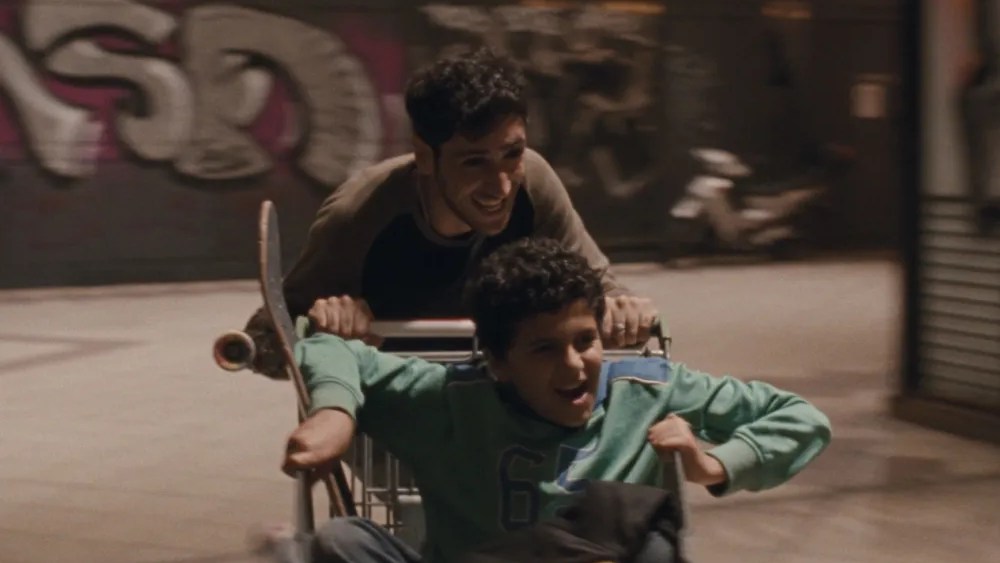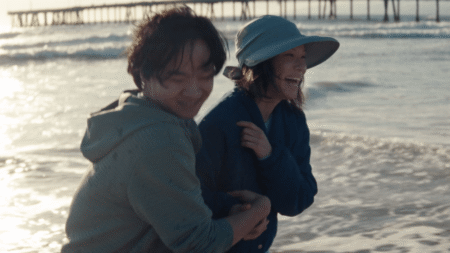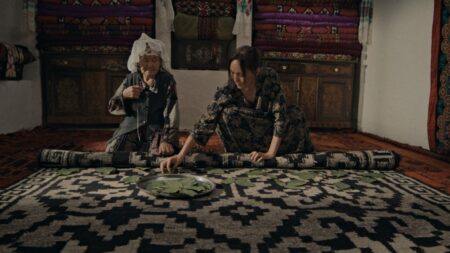Mahdi Fleifel’s “To a Land Unknown” won the Transilvania Trophy at the Transilvania Film Festival, Romania’s most prominent film fest. Noaz Deshe took the best directing award for “Xoftex,” while the Special Jury Award went to Julian Castronovo’s “Debut, or, Objects of the Field of Debris as Currently Catalogued.” Other award winners at the 2025 edition, which wraps this Sunday, June 22, include Bogdan Mureșanu’s “The New Year That Never Came,” Daniel Tornero’s “Saturn,” and Arjun Talwar’s “Letters From Wolf Street.”
This year’s festival, which saw over 200 features across the ten-day event, opened with Brendan Canty’s Berlinale entry “Christy” and wraps Sunday with a buzzy Cannes title in Oliver Laxe’s award-winning “Sirât.” 16 national features played within Romanian Days, from veterans such as Andrei Ujică (“TWST – Things We Said Today”) and Radu Jude (“Kontinental ‘25” and “Sleep #2”) to up-and-coming talent such as Mihai Dragolea and Radu Mocanu (“Tooth and Nail”) and Lina Vdovii and Radu Ciorniciuc (“Tata”). Conversations around the future of the country’s film industry took a timely turn when a new prime minister was announced during the festival, leading local filmmakers to wonder about pressing issues such as the continuity of Romania’s recently revamped cash rebate.
Those who attended the two intense days of pitching across several initiatives at the festival’s industry arm, the RO Days, could gather not only the general temperature of the region’s audiovisual industry but also key trends within film and television. Within these trends, nothing became clearer during the pitches than the gender divide between the two formats: while the vast majority of directors at the Transilvania Pitch Stop were women, all directors pitching at Drama Room, the television arm, were men, with the issues broached at both programmes reflecting that divide.
An overarching theme within the film projects at Pitch Stop was generational trauma in Romania and neighboring countries, especially experienced by women who have witnessed male violence for decades. Projects like Romania’s “At King’s Gate” and Hungary’s “Magda” follow women returning to their villages and being confronted with violence from both family and villagers, and modern-time offerings such as Romania’s “Horseshoe” and Turkey’s “Desire” and “Piatramare” chronicle contemporary issues faced by women, which include not only violence itself, but sexism, reproductive questions, and a search for independence.
Going from Pitch Stop to Drama Room meant a brusque shift, with all four projects grappling with questions either directly tied to or adjacent to modern masculinity. Elias Ferchin Musuret’s “Brothers” sets out to explore the undercurrent of sex-related human trafficking; Bogdan Drumea’s “The Accountant” and Viorel Ursu’s “The Fragrance of the Linden Trees” both grapple with widespread fraud schemes in post-communist Romania in the ’90s; and Alex Pintică and Alberto Niculae’s “ReGYM” tries to find the great Romanian sitcom by examining the modern young man through several stereotypes in a gym.
Courtesy of Transilvania Film Festival
Romania’s desire to step firmly into the series market was a constant theme throughout the industry days, with several talks dedicated to the subject. A team from Romanian free-to-air television network PRO TV presented an interesting breakdown of the country’s TV consuming habits, as well as highlighting the kinds of projects they are currently looking for, all to an eager room of young writers, directors, and producers more and more inclined to go into serialized content. As it stands, major local players such as PRO TV and its streaming arm VOYO, are looking for “series based on popular IP or real-life local events and personalities,” with the key element being local appeal.
Programming Director Antonii Mangov emphasized they are “not walking away from formats entirely, but want to focus on more local, original Romanian ideas,” especially those tapping into their most popular genres: crime, action, drama, comedy. PRO TV is also honing in on procedurals, biographies and medical dramas, tapping into a more Americanized thematic landscape. To experts, what doesn’t yet work on Romanian TV is genre, especially horror, sci-fi and dystopia, since the programming largely responds to the needs and constraints of primetime television.
With Romania being the country in Europe with the most hours spent in front of the television, a medium of 7 hours per day of linear TV consumption according to research presented by the PRO TV team, there is great growth potential in the region. Over the last decade, film directors have begun crossing the threshold into TV, with names like Igor Cobileanski briefly taking a step back from cinema to direct series such as HBO’s “Shadows” and “Hackerville.”
Asked about this tide, the director told Variety that the concept of series is “a very modern one in Romania,” but that he sees more and more of his colleagues focusing on serialized content. “Series are very big, much, much bigger than the arthouse films we are used to making in Romania. The visibility [series] bring is incomparable, we had no idea of its dimension before.” Other filmmakers like TIFF’s very own head of the festival Tudor Giurgiu, however, have reservations when it comes to this heavy focus on television over film, saying that the country’s cash rebate “should target more film projects” and “the primary focus should be on film,” particularly given the competitiveness of similar initiatives in the region.
Considering the recent success of the country’s cash rebate, which was revamped last year after being suspended in 2021 for unresolved payments, Romanian cinema and television seem to be in an optimistic, hopeful moment despite the country’s political and financial crisis.
Full list of winners below:
Main Competition:
- Transilvania Trophy, in the amount of 10,000 euros: “To a Land Unknown” (dir. Mahdi Fleifel, United Kingdom)
- Best Directing Award, in the amount of 3500 euros, offered by ICR: Noaz Deshe for “Xoftex” (Germany)
- Special Jury Award, in the amount of 1,500 euros, offered by ICR: “Debut, or, Objects of the Field of Debris as Currently Catalogued” (dir. Julian Castronovo, United States)
- Best Performance award, in the amount of 1,000 euros, offered by Conceptual Lab by Theo Nissim: Ghjuvanna Benedetti for “The Kingdom” (dir. Julien Colonna, France)
What’s Up, Doc?
- What’s up, Doc? Award, in the amount of 2,000 Euros, offered by Tenaris Silcotub: “Saturn” (dir. Daniel Tornero, Spain)
- Special Mention of the What’s Up, Doc? Jury: “The Return of the Projectionist” (dir. Orkhan Aghazadeh, France)
- Special Mention of the What’s Up, Doc? Jury: “Letters from Wolf Street” (dir. Arjun Talwar, Poland)
Romanian Days:
- Best feature film, in the amount of 1500 Euro, offered by DACIN SARA and grip and equipment services worth 10,000 Euro, offered by CINELAB România: “The new year that never came” (dir. Bogdan Mureșanu, Romania)
- Best Debut, in the amount of 1.500 euros, offered by Banca Transilvania: “Bright Future” (dir. Andra MacMasters, Romania)
- Best Short Film, in the amount of 1,500 and 5,000 euros (camera & electric & grip equipment services), offered by CutareFilm: “Aid” (dir. Valentin-Rareș Fogoroș, Romania)
- The Audience Award, in the amount of 2,000 euros, offered by MasterCard: “Deaf” (dir. Eva Libertad García López, Spain)
- Most Popular Romanian Film at the Festival (Vodafone Hearts’ Award), in amount of 2.500 euros, offered by Vodafone: “The new year that never came” (dir. Bogdan Mureșanu, Romania)
Transilvania Pitch Stop:
- Chainsaw Europe Award – 25,000 euros in post-production services: “Kazimir” (dir. Dorian Boguță)
- The TPS Development Award offered by Avanpost, in the amount of 5000 EUR: “Horseshoe” (dir. Lucia Chicoș)
- National Center of Cinematography of the Republic of Moldova Award, in the amount of 1,500 euros: “Desire” (dir. Nuray Kayacan Sünbül, Turkey)
Drama Room:
- Best Series Project Award, consisting of a development deal with PRO TV: “The Accountant” (screenwriter: Bogdan Drumea, Romania)
- Creative Residency at Bethlen-Haller Castle, for a project from the Drama Room, offered by Jidvei: “ReGYM” (screenwriters Alex Pintică, Alberto Nicolae, Romania)
Other awards:
- Excellency Award: director Andrei Ujica, offered by Nova Power & Gas
- Excellency Award: actor Florin Piersic
- Lifetime Achievement Award: director Béla Tarr
- Lifetime Achievement Award: actress Emila Dobrin
- Lifetime Achievement Award: film critic Valerian Sava
- Transilvania Trophy for Special Contribution to World Cinema: actress Maria de Medeiros
- FIPRESCI Award, offered by the Jury of the International Federation of Film Critics for a film from the Romanian Film Days section: “Merman” (dir. Ana Lungu, Romania)
- Youth Award (TEEN Spirit), in amount of 1,500 euros, offered by McDonalds: “Little Trouble Girls” (dir. Urška Djukić, Slovenia)
- Special mention of the Teen Spirit Jury: “The Girls at the Station” (dir. Juana Macías, Spain)
- Ecumenical Jury Award, in the amount of 1,000 euros offered by SIGNIS and INTERFILM, for a film from the Festival Competition: “Peacock” (dir. Bernhard Wenger, Germany)
- Special Mention of the Ecumenical Jury: “Rains Over Babel” (dir. Gala del Sol, Colombia)
- SIGNIS award, in the amount 500 euros, offered by SIGNIS Romania, to a short film from the Romanian Days Section: “Grandpa is sleeping” (dir. Matei Branea, Romania)
Read the full article here








